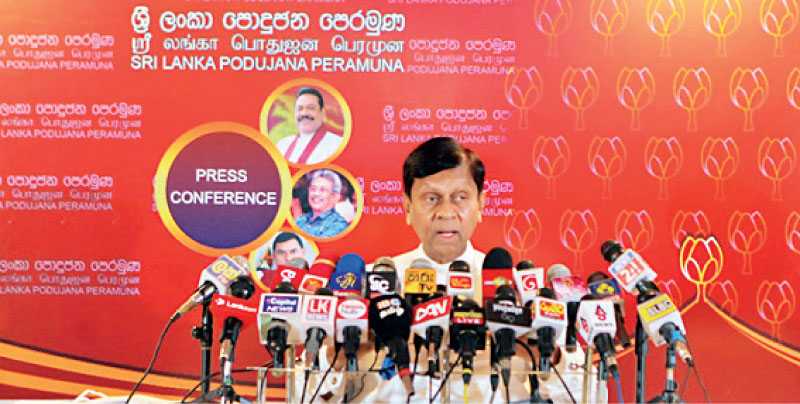Monday Feb 23, 2026
Monday Feb 23, 2026
Thursday, 28 January 2021 02:20 - - {{hitsCtrl.values.hits}}

Ajith Nivard Cabraal
By Darshana Abayasingha
State Minister for Money, Capital Markets and State Enterprise Reforms Ajith Nivard Cabraal, yester-day sought to dispel speculation on Sri Lanka’s economic fundamentals asserting that the Government has taken all necessary steps to manage the economy and position the country on a growth trajectory whilst meeting all international obligations. Speaking at a press conference Cabraal noted that 2021 has so far seen speculative behaviour from the outset, resulting in some forward contracts and stated that the Central Bank has been activated to take necessary corrective steps.
“I believe the rupee should sit at around Rs. 185 against the US dollar. Considering the macro economic situation no one needs to be unnecessarily concerned, and we wish to advice our exporters to convert their earnings into rupees. We must embark on this journey together during this difficult time. If any-one tries to rock the boat, it affects everyone in it. We can still steer this boat. But if anyone still tries to rock the boat, we will have to take measures to control them as the Central Bank is doing now,” he said.
Providing context to his standpoint, Cabraal noted that in 2014 the rupee was Rs. 131 against the dollar when the then government was charged with controlling exchange rates instead of allowing a float. However, with the Yahapalana government taking over, the rupee had depreciated as much as 6.7% annually to end at Rs. 181.63 during a period of no global economic turmoil, he said.
He added that with the advent of the current administration, the rupee has only depreciated to Rs.186, or 2.6%, at the end of the 2020, despite a global economic slowdown due to the pandemic. In addition, the Central Bank was able to buttress reserves by a further $ 282 million, Cabraal said, and “ensured the entire economy was not put in jeopardy”.
Speaking further he noted that Sri Lanka is not considering issuing any new International Sovereign Bonds in the near future but that the country has made progress on swap arrangements with India and China, which would be finalised soon. Cabraal said that when he stepped down as Governor of the Central Bank in 2014, the country had issued $ 5 billion in sovereign bonds at 5.71%, but by end 2019 the country had issued over $ 15 billion in bonds at a rate of 7.35%, adding over Rs. 170 billion in debt payments to state coffers.
Despite the above, Cabraal said Sri Lanka was still in a good position to issue International Sovereign Bonds to raise money, but it has chosen instead to balance its foreign-to-local debt ratio which is skewed heavily towards external markets.
“In 2020, we were able to reduce interest payments on Treasury Bills and Bonds up to Rs. 283 billion through our management practices. We are not near collapse as some so-called experts vested with the opposition make it out to be. We have empowered small and medium business owners through our efforts. Instead of Sovereign Bonds we will attract foreign currency through different means. The World Bank said workers remittances will go down as much as 20% last year. We didn’t accept that, and we took measures to address this, and it went up by 6% to as much as $ 7.1 billion. We hope to see this figure increase another $ 1 billion by next year. People keep saying go to the IMF, but the first thing they say is devalue the rupee, and you know what that does to our debt situation. We are looking at a set of policies which suit and benefit the country.”
The State Minister said Sri Lanka is looking to attract over $ 2.5 billion in foreign investment this year, and that draft regulations and legal framework governing the Colombo Port City would be tabled in Parliament shortly.
Journalists also raised questions on the controversy surrounding the East Container Terminal (ECT) of the Colombo Port. The State Minister asserted that this was merely an investment agreement, whereby the Sri Lanka Ports Authority maintains control of the operation. He said an MOU to this ef-fect has already been signed between the governments of Sri Lanka, India and Japan in 2019, and the country must respect and honour international agreements. Sri Lanka cannot abrogate international agreements and appear unilateral in taking decisions without being sensitive to another country’s po-sition, he said.
“This terminal is being developed for transshipment cargo, and specifically targeting India. Therefore, it makes sense to enter into an agreement with India on this matter, and we retain the controlling share. We are inviting partners who will be partners of that business, so they also could generate some in-come for themselves. There is no point having an empty jetty. We want to have business there from day one. What is the point if ships don’t come? The business will come also because India is connected to it, and Japan will provide the technical assistance.”
